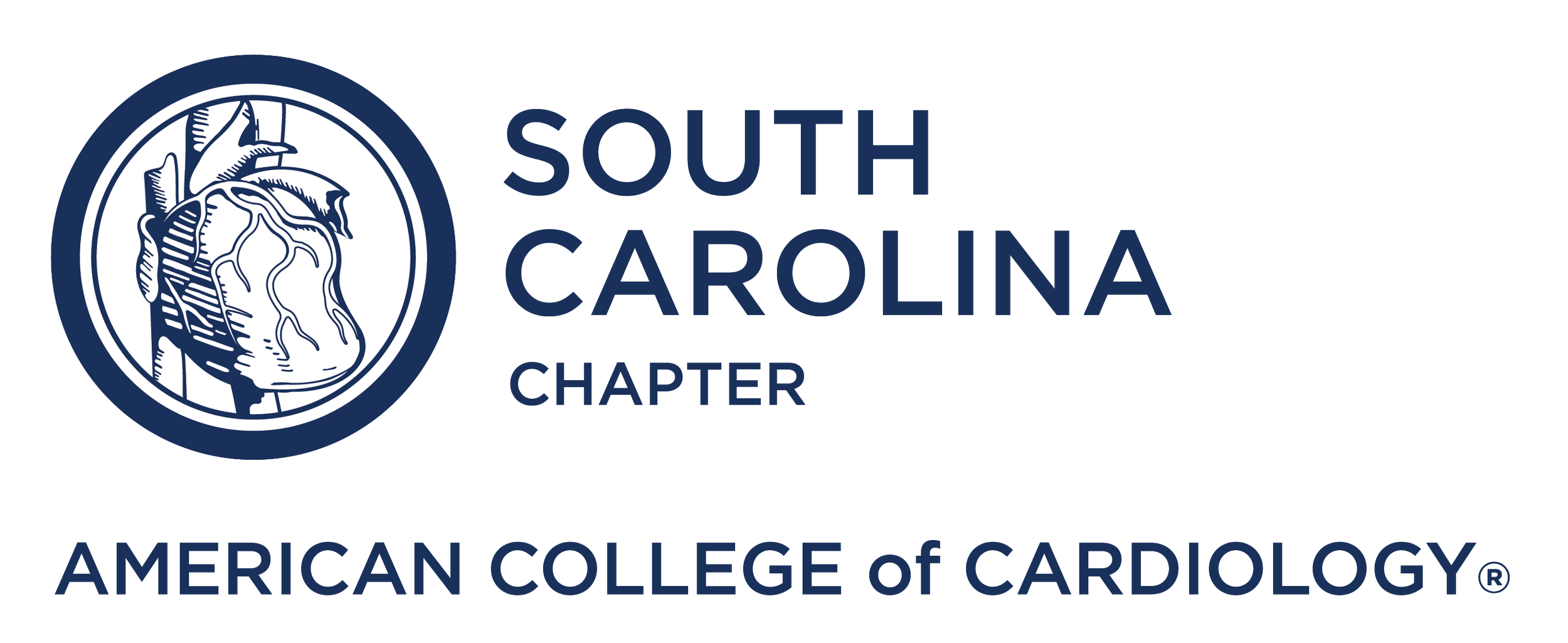OUR MISSION
To support South Carolina cardiovascular specialists as they serve their patients.
The South Carolina Chapter of the ACC is a 501-C (6) not-for-profit corporation and was incorporated on July 12, 1994. It currently has approximately 500 dues paying members.
Click here to view our bylaws in PDF format.
Please contact us: info@sccacc.org
The South Carolina Chapter is a State Chapter of the American College of Cardiology
The American College of Cardiology envisions a world where innovation and knowledge optimize cardiovascular care and outcomes. As the professional home for the entire cardiovascular care team, the mission of the College and its more than 54,000 members is to transform cardiovascular care and to improve heart health. The ACC bestows credentials upon cardiovascular professionals who meet stringent qualifications and leads in the formation of health policy, standards and guidelines. The College also provides professional medical education, disseminates cardiovascular research through its world-renowned JACC Journals, operates national registries to measure and improve care, and offers cardiovascular accreditation to hospitals and institutions. For more, visit acc.org
Complex Congenital Heart Defect Patient Communication Tool
The SC Chapter awarded a grant for the project, “Children’s Heart Program of South Carolina" in 2013. The Chapter felt the project will greatly increase communication between cardiologists, providers and patients and be a great benefit to South Carolina patients. Learn about the outcomes and results below.
The Children’s Heart Program of South Carolina is a statewide network of pediatric cardiology providers offering comprehensive care to all children in South Carolina and surrounding regions. The mission of this program is to provide the best possible coordinated care to patients with complex congenital heart disease.
Primary Heart Program locations include Charleston, Columbia, Greenville and Florence, with outreach clinics in Anderson, Spartanburg, Murrells Inlet, Beaufort and North Charleston. The Children’s Heart Center at MUSC serves as the only location for invasive procedures in the state, including pediatric heart catheterizations and surgeries. Patients with complex congenital heart disease require accurate and effective communication among providers.
This patient communication tool was inspired by an adult patient with complex single ventricle anatomy who presented to an outside emergency department with symptoms of septic shock. She had significant hypotension with her blood pressure being monitored in her right arm. However, with her complex anatomy and history of previous cardiac surgeries, the blood supply to her right arm was compromised and should never have been used to monitor blood pressure. She was given excessive IV fluids for resuscitation and as a result, developed severe heart failure requiring a lengthy admission in the ICU. Perhaps if the clinicians were aware of her cardiac anatomy and medical history, this could have been prevented.
The communication tool provides a personalized binder with a diagram of the patient’s heart anatomy and clearly defined baseline vital signs. A medication record, infant feeding plan, list of primary care and specialty providers and important medical history details are all included in the binder. We encourage patients and their parents to have this binder with them for routine clinic visits and emergency department visits.
While the efficacy of this tool is difficult to measure, we feel confident that providing a concise and accurate medical history resource to our patients allows clinicians to better understand their complex heart disease and treat them appropriately. We hope to continue supplying this valuable resource to our congenital heart patients.
Click here to view the table which provide a brief description of the complex congenital heart disease and address of patients who have been provided with the Patient Communication Tool.
The PINNACLE Network™
The American College of Cardiology has launched the PINNACLE Network™, the first-ever registry-based cardiovascular network to link thousands of cardiology practices to each other and to the ACC’s National Cardiovascular Data Registry® (NCDR), the preeminent cardiovascular data repository in the United States.
The PINNACLE Network™ immediately addresses the rapidly shifting business environment that private cardiovascular practices face with a wealth of practice management and financial management tools. The PINNACLE Network™ also builds a foundation for innovative, registry-based systems to reward practices for the high quality care that they provide.
Specifically, the PINNACLE Network builds on the College's commitment, experience and leadership in cardiovascular care and forms a one-stop shop for:
Practice management tools
Workflow and workforce solutions
Educational and advocacy resources
Health IT tools
Risk management strategies for lowering medical
liability costs, and
The PINNACLE Registry – formerly the IC3 Program
The PINNACLE Registry™, designed by cardiologists, benefits from its two-year pilot phase as the IC3 Program and now will be integrated into the NCDR® to provide participants with access to both hospital and ambulatory patient-focused data. As one of the largest practice-level scientific efforts undertaken in the United States, the IC3 Program®, now the PINNACLE Registry™, contains hundreds of thousands of clinical patient records focusing on four common cardiac conditions – coronary artery disease, hypertension, heart failure and atrial fibrillation.
For more information on the ACC’s PINNACLE Network™ visit www.pinnaclenetwork.org

